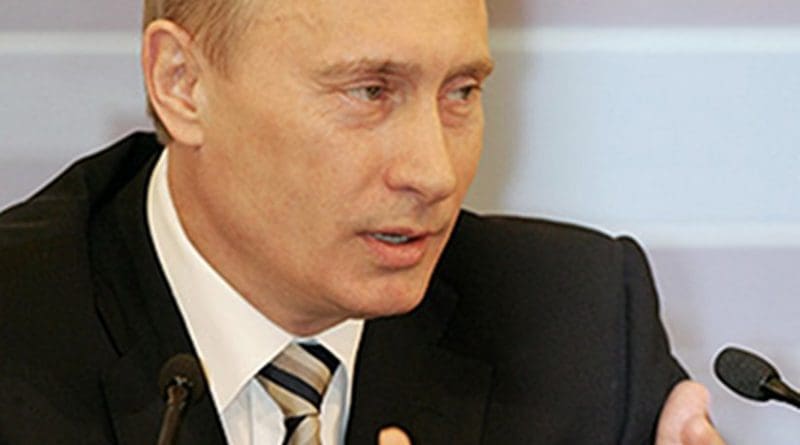Putin Opening ‘Second’ And Different ‘Front’ Against West In Syria, Felshtinsky Says – OpEd
By Paul Goble
With the dispatch of Russian troops to Syria, Vladimir Putin has opened ‘a second front’ against the West, one that is very different in its methods and intentions than the first one in Ukraine that he continues to pursue, according to Russian-American historian Yury Felshtinsky.
In Ukraine, Putin has pursued “a ‘hybrid’ battle only in the sense that he has been pursuing a double goals: first, to seize Ukraine and start the restoration of ‘a Soviet Union’ or ‘a Russian Empire’ … and second, to show the entire world that Russia has the right to territorial conquests … beyond the current Russian borders” (apostrophe.com.ua/article/world/ex-ussr/2015-09-10/ne-tolko-ukraina-zachem-putin-otkryivaet-vtoroy-front-v-sirii/2238).
In Syria, on the other hand, Felshtinsky continues, Russia’s actions are not “’hybrid’” in any sense. Rather, they are “a continuation of the old Soviet policy which on the whole never changed” and that may be better described as “schizophrenic,” that is, one that involved as in the case of Israel supporting one country and then selling arms to that country’s enemies.
“Russian policy toward Syria and Russian military actions in Syria … serve [those] same goals,” he argues. “It is important to Putin to show Europe and the US that Russia has the right to use its forces far beyond its borders if the interests of the state require this.” Putin thus considers that he is “acting ‘exactly the same’ as the US has in Iraq.
By sending troops to Syria, “Putin wants to show the world” that Russia has “parity” relations with the US. At his upcoming speech at the United Nations, Felshtinsky suggests, the Russian leader’s central message is thus going to be that “Russia is permitted to do what the US is permitted to do.”
In that speech, the Russian-American analyst says, “Putin will declare to the entire world that the rules of the game have changed and that Russia must be taken into account because it has an army and nuclear weapon and intends to use in the resolution of its foreign policy tasks both the first and the second.”
The Russian army, “the first foreign policy instrument,” has been used for some time: in Chechnya, in Transdniestria, in Georgia, in Ukraine and now in Syria. The second, nuclear weapons, “remains in reserve.” Putin and his entourage will constantly remind the world of what could happen “if they push a rat into a corner.’”
All this means, the analyst says, that “the entire world now is concerned with yet another delicate mission: how to get the rat out of the corner in which he has gone of his own volition and does not want to leave although all the doors are open.”
“The optimists hope that Putin will publicly declare at the UN about his coming out of the corner,” Felshtinsky says, adding that he personally is not one of them and does not expect anything good.”
The reason is simple: “there are already consequences from the conduct of the military campaign in Syria, and they are very serious” because “the entire world considers these consequences catastrophic but Putin views them as positive.”
In the course of a very brief time, “Russia has been transformed from a peaceful partner into a militant opponent,” whose economy is no longer linked to the work market system but is suffering because of the falling prices for oil.
“Putin,” Felshtinsky argues, “consider this as the price for a new policy of Russia. Having devalued the ruble, he has made all the citizens of the Russian Federation into fellow participants of his foreign policy operations,” even though they have little or no influence on his decisions and aren’t about going into the square to “demand the overthrow of the Putin regime.”


“It is important to Putin to show Europe and the US that Russia has the right to use its forces far beyond its borders if the interests of the state require this.” Putin thus considers that he is “acting ‘exactly the same’ as the US has in Iraq.
Wouldn’t he be correct in that assumption…you do however leave out the part that the US and it’s allies are supplying ISIS and Al Qaeda with weapons and training in order to overthrow Assad. But the caveat is, that it’ a secret…..it’s as if we are supplying them with weapons to kill themselves. Putin simply wants to help get rid of ISIS. Why would the US decline that type of support?
America have at last met its match..watch this space